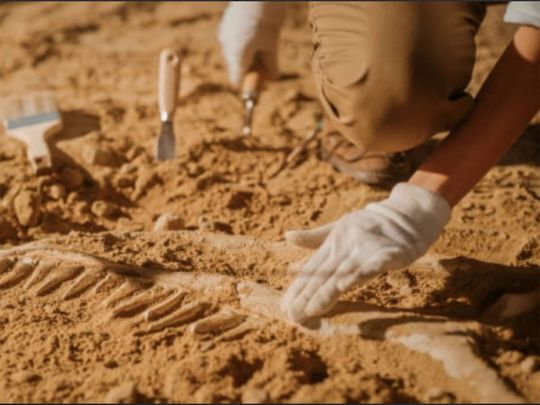Saudi Arabia discovers 56-million-year-old marine fossils

Ancient Marine Fossils Discovered in Saudi Arabia
In a remarkable discovery, scientists have unearthed fossils of marine creatures that date back 56 million years in Saudi Arabia. This significant find offers valuable insights into the ancient ecosystems that once thrived in the region. The fossils were discovered in the Ras Al Ru’us sedimentary area, located in the Northern Borders region of the country. This area is known for its rich geological history, and the recent findings further underscore its importance in understanding the Earth’s past.
Significance of the Discovery
Tariq Aba Al Khail, a spokesman for the Saudi Geological Survey (SGS), announced the discovery, which includes vertebrate remains embedded in limestone rock formations. The fossils primarily consist of imprints and internal molds of bony fish, including extinct catfish species known as silurians. These findings are particularly significant as they provide rare insights into the marine communities of the early Eocene epoch, a crucial period in Earth’s history.
The Eocene epoch, which lasted from approximately 56 million to 33.9 million years ago, is part of the Paleogene period. It follows the Paleocene epoch and precedes the Oligocene epoch. During this time, the Earth experienced significant climatic changes and the evolution of diverse life forms. The fossils discovered in Saudi Arabia offer a unique window into the Tethyan Sea, a prehistoric body of water that once spanned vast areas of the Middle East and Asia. This ancient sea was home to a variety of marine life, and the newly found fossils help scientists piece together the ecological dynamics of that era.
MOL and Bapco Energies Sign MoU for Development of Cross Border CO2 Transport and Sequestration
Future Research and Implications
This discovery marks the first time vertebrate fossils from the Eocene epoch have been found in Saudi Arabia. Aba Al Khail emphasized the importance of this find in understanding the ancient environment and the paleogeographic context of the region. The Ras Al Ru’us formation has long been recognized for its rich sedimentary layers, but this recent discovery highlights its value as a key site for uncovering evidence of early marine ecosystems.
Researchers at the SGS are currently conducting further studies to analyze the fossils. They believe that these investigations could reveal more about the biodiversity and climatic conditions of the time. Understanding these ancient ecosystems is crucial for scientists as it helps them comprehend how marine life has evolved over millions of years. The findings may also have implications for current biodiversity and conservation efforts, as they provide a historical context for the changes that have occurred in marine environments over time.
Overall, this discovery not only enriches our understanding of the past but also emphasizes the importance of continued geological research in uncovering the mysteries of our planet’s history.
